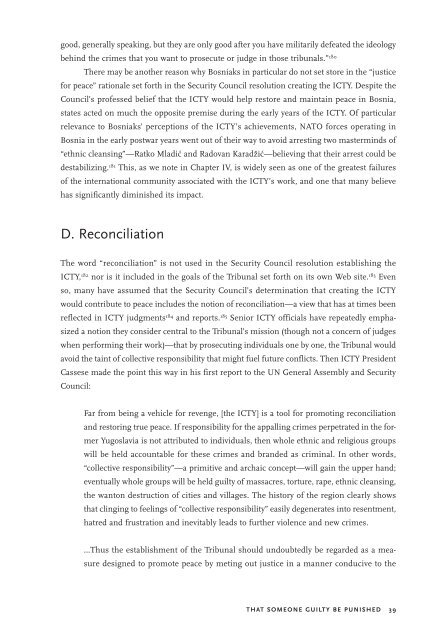That Someone Guilty Be Punished - Open Society Foundations
That Someone Guilty Be Punished - Open Society Foundations
That Someone Guilty Be Punished - Open Society Foundations
You also want an ePaper? Increase the reach of your titles
YUMPU automatically turns print PDFs into web optimized ePapers that Google loves.
good, generally speaking, but they are only good after you have militarily defeated the ideology<br />
behind the crimes that you want to prosecute or judge in those tribunals.” 180<br />
There may be another reason why Bosniaks in particular do not set store in the “justice<br />
for peace” rationale set forth in the Security Council resolution creating the ICTY. Despite the<br />
Council’s professed belief that the ICTY would help restore and maintain peace in Bosnia,<br />
states acted on much the opposite premise during the early years of the ICTY. Of particular<br />
relevance to Bosniaks’ perceptions of the ICTY’s achievements, NATO forces operating in<br />
Bosnia in the early postwar years went out of their way to avoid arresting two masterminds of<br />
“ethnic cleansing”—Ratko Mladić and Radovan Karadžić—believing that their arrest could be<br />
destabilizing. 181 This, as we note in Chapter IV, is widely seen as one of the greatest failures<br />
of the international community associated with the ICTY’s work, and one that many believe<br />
has significantly diminished its impact.<br />
D. Reconciliation<br />
The word “reconciliation” is not used in the Security Council resolution establishing the<br />
ICTY, 182 nor is it included in the goals of the Tribunal set forth on its own Web site. 183 Even<br />
so, many have assumed that the Security Council’s determination that creating the ICTY<br />
would contribute to peace includes the notion of reconciliation—a view that has at times been<br />
reflected in ICTY judgments 184 and reports. 185 Senior ICTY officials have repeatedly emphasized<br />
a notion they consider central to the Tribunal’s mission (though not a concern of judges<br />
when performing their work)—that by prosecuting individuals one by one, the Tribunal would<br />
avoid the taint of collective responsibility that might fuel future conflicts. Then ICTY President<br />
Cassese made the point this way in his first report to the UN General Assembly and Security<br />
Council:<br />
Far from being a vehicle for revenge, [the ICTY] is a tool for promoting reconciliation<br />
and restoring true peace. If responsibility for the appalling crimes perpetrated in the former<br />
Yugoslavia is not attributed to individuals, then whole ethnic and religious groups<br />
will be held accountable for these crimes and branded as criminal. In other words,<br />
“collective responsibility”—a primitive and archaic concept—will gain the upper hand;<br />
eventually whole groups will be held guilty of massacres, torture, rape, ethnic cleansing,<br />
the wanton destruction of cities and villages. The history of the region clearly shows<br />
that clinging to feelings of “collective responsibility” easily degenerates into resentment,<br />
hatred and frustration and inevitably leads to further violence and new crimes.<br />
…Thus the establishment of the Tribunal should undoubtedly be regarded as a measure<br />
designed to promote peace by meting out justice in a manner conducive to the<br />
THAT SOMEONE GUILTY BE PUNISHED 39

















